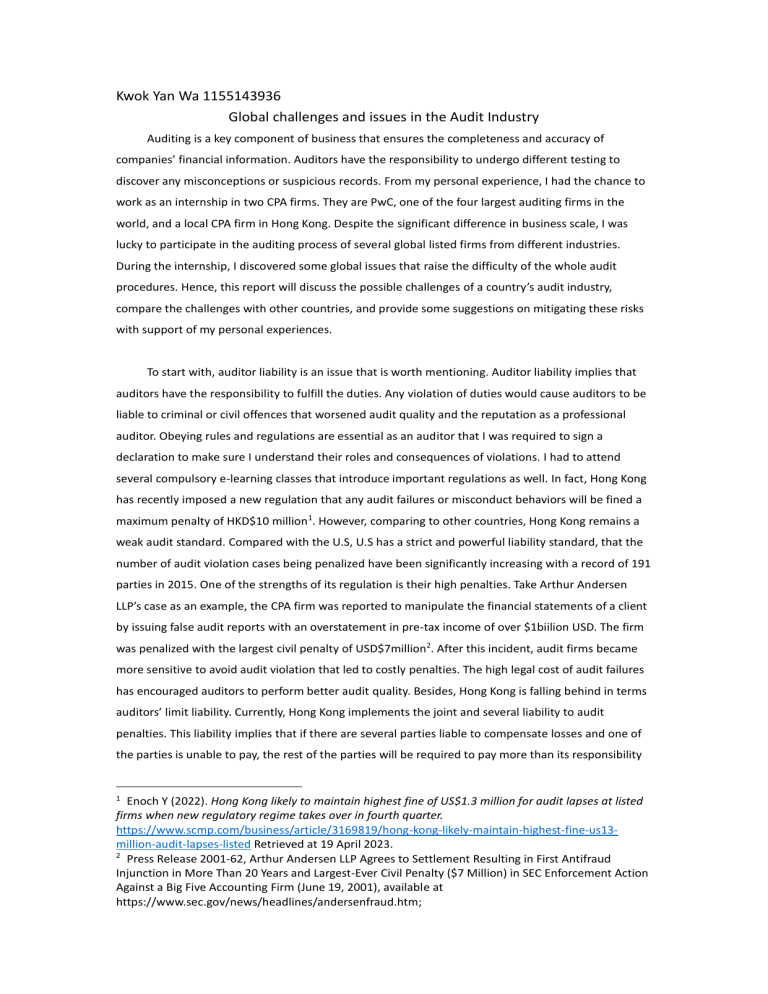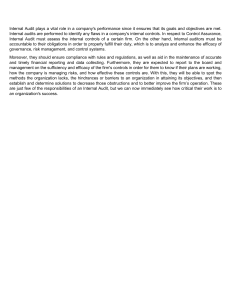
Kwok Yan Wa 1155143936 Global challenges and issues in the Audit Industry Auditing is a key component of business that ensures the completeness and accuracy of companies’ financial information. Auditors have the responsibility to undergo different testing to discover any misconceptions or suspicious records. From my personal experience, I had the chance to work as an internship in two CPA firms. They are PwC, one of the four largest auditing firms in the world, and a local CPA firm in Hong Kong. Despite the significant difference in business scale, I was lucky to participate in the auditing process of several global listed firms from different industries. During the internship, I discovered some global issues that raise the difficulty of the whole audit procedures. Hence, this report will discuss the possible challenges of a country’s audit industry, compare the challenges with other countries, and provide some suggestions on mitigating these risks with support of my personal experiences. To start with, auditor liability is an issue that is worth mentioning. Auditor liability implies that auditors have the responsibility to fulfill the duties. Any violation of duties would cause auditors to be liable to criminal or civil offences that worsened audit quality and the reputation as a professional auditor. Obeying rules and regulations are essential as an auditor that I was required to sign a declaration to make sure I understand their roles and consequences of violations. I had to attend several compulsory e-learning classes that introduce important regulations as well. In fact, Hong Kong has recently imposed a new regulation that any audit failures or misconduct behaviors will be fined a maximum penalty of HKD$10 million 1. However, comparing to other countries, Hong Kong remains a weak audit standard. Compared with the U.S, U.S has a strict and powerful liability standard, that the number of audit violation cases being penalized have been significantly increasing with a record of 191 parties in 2015. One of the strengths of its regulation is their high penalties. Take Arthur Andersen LLP’s case as an example, the CPA firm was reported to manipulate the financial statements of a client by issuing false audit reports with an overstatement in pre-tax income of over $1biilion USD. The firm was penalized with the largest civil penalty of USD$7million2. After this incident, audit firms became more sensitive to avoid audit violation that led to costly penalties. The high legal cost of audit failures has encouraged auditors to perform better audit quality. Besides, Hong Kong is falling behind in terms auditors’ limit liability. Currently, Hong Kong implements the joint and several liability to audit penalties. This liability implies that if there are several parties liable to compensate losses and one of the parties is unable to pay, the rest of the parties will be required to pay more than its responsibility 1 Enoch Y (2022). Hong Kong likely to maintain highest fine of US$1.3 million for audit lapses at listed firms when new regulatory regime takes over in fourth quarter. https://www.scmp.com/business/article/3169819/hong-kong-likely-maintain-highest-fine-us13million-audit-lapses-listed Retrieved at 19 April 2023. 2 Press Release 2001-62, Arthur Andersen LLP Agrees to Settlement Resulting in First Antifraud Injunction in More Than 20 Years and Largest-Ever Civil Penalty ($7 Million) in SEC Enforcement Action Against a Big Five Accounting Firm (June 19, 2001), available at https://www.sec.gov/news/headlines/andersenfraud.htm; proportion. This approach is unfair particularly to audit firms since it means that audit firms could have a higher possibility of being liable to pay disproportionately more when other smaller business parties are unaffordable to pay penalties. However, other countries such as Australia, Canada, the UK and the US3 are implementing the proportionate liability approach instead which requires parties to pay damages limited to the assessed proportion of responsibility only and not obliged to pay additional fees. This is a fairer approach to protect and restrict auditors’ responsibilities on liabilities. With the above comparison, this has proved that Hong Kong performs poorly in regulating auditors’ liabilities and have comparatively low penalties. Under this legal environment, it will discourage foreign auditors to join the Hong Kong market and scare away future generations to join the industry. The Hong Kong government should rewrite the regulations by changing to a proportionate liability penalty system and raise the legal cost charge for audit failures in order to establish a fair and highquality audit environment. Besides, global communication issues might occur. Multinational companies (MNCs) are largescaled businesses with subsidiaries established across the world. However, parent companies and subsidiaries will normally appoint different audit teams according to where the companies are operating. Since audit procedures are done by different talents, parent company auditors may have a lack of understanding on subsidiaries’ financial performance and have confusions on other teams’ audit testing. This is a common issue in the industry. During my internship, my client was a Hong Kong subsidiary of a Chinese Bank. Whenever there are significant and uncertain related party transactions with the bank, our team will contact the responsible audit team to ask for supporting documents and explanations of those transactions. Since the responsible audit team is simply PwC China, we could contact and communicate with colleagues easily and they were willing to provide information. Yet if the counterparty’s auditing is done by another firm, communication could be more difficult. Analysts suggest that higher client complexity in terms of client size, language barriers and organization structure could lead to deficiencies in global group audits4, which implies that the globalized feature of MNCs have pose challenges to auditors. The effect behind miscommunication could be significantly serious. Even though subsidiary auditors have concluded their financial statements to have no material discrepancies, group auditors have the responsibility to double check financial records of subsidiaries instead of fully relying on other auditors’ results, or else neglected material misstatements of subsidiaries could possibly cause material errors in the consolidated group report. A way to mitigate any misstatements is to discuss with subsidiaries auditors on any large transactions that could affect group performance and the susceptibility of errors and misstatements 5. Further 3 HKICPA (2005). “A Case for Professional Liability Reform in Hong Kong. https://www.hkicpa.org.hk/professionaltechnical/liability/liability_reform.pdf Retrieved at 19 April 2023. 4 Downey D H, Bedard J (2018). Coordination and Communication Challenges in Global Group Audits https://www.thecaq.org/wp-content/uploads/2018/03/caq_research_journal-articles_coordinationand-communication-challenges-in-global-audit-groups.pdf Retrieved at 19 April 2023. 5 ACCA. ISA 600 (revised and redrafted), special considerations – audits of group financial statements actions will be taken if necessary after considering and evaluating the subsidiary’s financial statements, such as further audit testing and evidence. Moreover, to avoid lack of communication between cross-border audit teams, the group audit should contact the subsidiaries’ audit team as early as during the audit planning stage so that group auditors can inform subsidiary auditors in advance on the financial evidence that are expected to gather5. In this way, it ensures sufficient communication between all auditors of the group and minimize the chance of false statements. At last, cultural difference across global audit teams could be a concern. Although auditing is currently globally standardized with identical or similar international auditing standards, different cultures of the auditors could create barriers and quality differences between one another. Culture does not only affect how a person lives and his mindset, but also how a person works and communicates. From my personal experiences, my team consists of 2 Indian colleagues. However, since the Indians have a special English accent and they are usually quiet, I had difficulties on communicating and asking questions. In a broader working environment viewpoint, different countries vary in terms of working opportunities and environment. In Brazil, local auditors are less willing to speak up that would cause junior colleagues to not point out any errors and mistakes made by seniors6. This can cause possible manipulation or fraud issues when juniors detected suspicious acts by seniors but neglected to report the act. Audit quality can be highly affected. For Australia, even though they have high audit quality and locals are encouraged to speak up, the local industry is currently facing talent shortages since more young generations preferred to work overseas6. Furthermore, in some conservative-cultured Asian countries such as Korea and Japan, they have strict hierarchy system in which promotions are difficult for young generations as the society believes that youngsters should respect older colleagues and shouldn’t work at the same title position with older colleagues despite youngsters are wellperformed6. This is unfair for colleagues who have outstanding performances but restricted by the traditional age society. Hence, locals may be discouraged to perform better since there are no working incentives and they can’t benefit from their outstanding performance. This will harm the audit quality and may release false opinions as the colleagues are doing the bare minimum of work. Finally in Hong Kong’s case, there has been a huge shortage of talents joining the industry, one reason is due to the imbalanced work life balance with long overtime hours. It has been an issue in Hong Kong for many years that the working environment of auditors is very intense with people even suicide their lives due to high pressure. As Hong Kong people nowadays are more eager to strike for work life balance, there is a decreasing number of auditors. The mentioned aspects of culture have caused the audit performance and working environment of countries to vary. This has proven a reason why well(including the work of component auditors). https://www.accaglobal.com/gb/en/student/examsupport-resources/professional-exams-study-resources/p7/technical-articles/group-audit-issues.html Retrieved at 19 April 2023. 6 CareersinAudit.com (2020). External Audit around the World. https://www.careersinaudit.com/article/external-audit-around-the-world/ 2023. Retrieved at 19 April developed countries such as the US and UK are performing better than other countries. The audit quality between countries isn’t consistent so it is recommended for developing audit industry countries like Brazil to be aware of the cultural differences and take actions. To conclude, with easier access to global information, there are more comparisons on audit industries between countries. Comparing to the UK and US, Hong Kong has been lacking in the audit industry due to its joint and several auditor liability nature and shortage of labour. The government should reconsider how to revive the industry to avoid reducing Hong Kong’s market position of businesses. Bibliography ACCA. “ISA 600 (revised and redrafted), special considerations – audits of group financial statements (including the work of component auditors)”. https://www.accaglobal.com/gb/en/student/exam-support-resources/professionalexams-study-resources/p7/technical-articles/group-audit-issues.html Retrieved at 19 April 2023. CareersinAudit.com (2020). External Audit around the World. https://www.careersinaudit.com/article/external-audit-around-the-world/ Retrieved at 19 April 2023. Downey D H, Bedard J (2018). “Coordination and Communication Challenges in Global Group Audits” https://www.thecaq.org/wpcontent/uploads/2018/03/caq_research_journal-articles_coordination-andcommunication-challenges-in-global-audit-groups.pdf Retrieved at 19 April 2023. Enoch Y (2022). “Hong Kong likely to maintain highest fine of US$1.3 million for audit lapses at listed firms when new regulatory regime takes over in fourth quarter”. https://www.scmp.com/business/article/3169819/hong-kong-likely-maintainhighest-fine-us13-million-audit-lapses-listed Retrieved at 19 April 2023. HKICPA (2005). ““A Case for Professional Liability Reform in Hong Kong”” https://www.hkicpa.org.hk/professionaltechnical/liability/liability_reform.pdf Press Release 2001-62, Arthur Andersen LLP Agrees to Settlement Resulting in First Antifraud Injunction in More Than 20 Years and Largest-Ever Civil Penalty ($7 Million) in SEC Enforcement Action Against a Big Five Accounting Firm (June 19, 2001), available at https://www.sec.gov/news/headlines/andersenfraud.htm;


